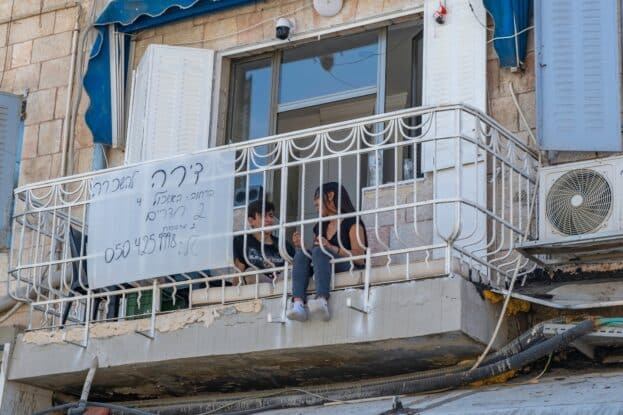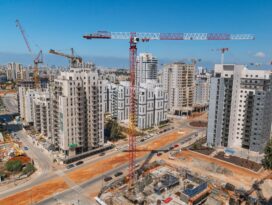Thousands of evacuees from apartments damaged during Operation Rising Lion have flooded the rental market at the height of the summer season, sending demand soaring—particularly in already high-demand areas. Real estate brokers say that while some landlords are showing solidarity by keeping prices steady, other landlords raise rents without hesitation. “Before the war, a four-room apartment with a safe room rented for an average of NIS 6,500,” said one broker in Rehovot. “Today, that number has already climbed to NIS 7,500.” The rental market after missile attacks is feeling the pressure—and prices are starting to reflect it.
By Doron Breitman, Nadlan Center
Among the buildings damaged during Operation Rising Lion, the central city of Rehovot sustained two direct missile strikes—one at the Weizmann Institute and another in the city center near the city’s main market. In total, 14 buildings were declared for demolition, 8 were deemed structurally unsafe, and 28 others were evacuated for repairs. Approximately 700 residents were displaced, with 340 relocated to hotels. The nearby city of Ness Ziona was also hit, with a missile damaging around 320 homes to varying extents and forcing 131 residents into temporary hotel housing. Ness Ziona’s mayor, Shmuel Boxer, described the situation at a recent Knesset Interior and Environmental Protection Committee meeting: “We don’t have enough alternative rental housing in Ness Ziona,” he said.
According to Avi Pinchas, franchise owner of Anglo-Saxon Rehovot and Mazkeret Batya, the missile strikes have had a clear impact on the rental market. “Demand for rentals is rising—it’s obvious—and at the same time, there’s nothing available. We’ve had inquiries from people living near the market, right by where the missile landed, and we had no apartments to offer them. Even without the war with Iran, summer always brings higher demand, but since the dust settled, the demand for rentals has only grown stronger.” Pinchas says that rental prices in Rehovot have increased by about NIS 1,000 since the war. “It’s a price jump driven by the lack of available apartments. Before the war, a four-room apartment with a safe room averaged NIS 6,500. Today, it’s NIS 7,500.”
But the figures from Rehovot and Ness Ziona pale in comparison to Ramat Gan, Tel Aviv, Bat Yam, and Bnei Brak. In Ramat Gan, for example, three missile strikes forced 4,000 residents to evacuate, some to hotels and others who self-evacuated to friends or family. A total of 257 buildings across the city were affected, five of which have already been demolished.
“There’s barely any supply and enormous demand,” says Ronit Peled, franchise owner of Anglo-Saxon Ramat Gan-Givatayim. “It was already a tight market for rentals, and now even more so. We get 10 to 15 inquiries a day and have nothing to offer. Most people are looking for apartments with a safe room or shelter—I hear that in almost every call. Some want short-term rentals, for six to eight months, while others are looking for something for three years. I reach out to many landlords who tell me they already have a waiting list.” According to Peled, “Renters no longer care which part of the city they’re in. At first, they wanted to stay in the same area, but now it doesn’t even matter. But there’s simply nothing to offer. I’ve never received this volume of rental inquiries—nearly every call is about rentals.”
And what about prices? With surging demand and shrinking supply, one might expect rental prices to rise. However, Peled claims there’s no dramatic change in prices for now. In transactions she’s handled, four-room apartments with a safe room rented for around NIS 7,500 a month, while newer buildings can reach NIS 8,500–10,000. Still, she says, “I’m seeing a trend among landlords trying to exploit the situation and raise rents. But everyone needs to pitch in during times like these. I truly hope landlords will act reasonably and not take advantage of this crisis.”
“In Bat Yam, supply still meets demand”
A missile strike in Bat Yam caused massive destruction, spanning a 200-meter radius and affecting approximately 110 buildings. Of these, 20 were deemed structurally unsafe, requiring demolition rather than repair. Around 1,600 residents were evacuated.
Eyal Yemini, CEO and owner of RE/MAX Center in Holon, Bat Yam, and Rishon LeZion, notes a noticeable uptick in rental demand. “We’ve had many displaced residents contact us. Some want short-term rentals because their buildings weren’t totally destroyed but need renovation. Others need longer-term solutions because their buildings are slated for demolition. In both Holon and Bat Yam, we’re seeing more pressure and specific demands, like needing a safe room or avoiding older buildings.” Still, he says, “Overall, the supply is currently meeting demand—not in every neighborhood, but generally speaking, it’s manageable.”
When it comes to rising rents in the city, Yemini observes: “There’s definitely a trend of landlords renewing leases with plans to raise the rent—especially in recent weeks. I’ve personally received many calls from landlords intending to increase rental prices.”
Tel Aviv: Landlords showing solidarity
What’s the situation like in Tel Aviv? According to Shirli Werner, franchisee of RE/MAX Ocean Tel Aviv, and David Lev Ari, real estate consultant at RE/MAX Ocean North Tel Aviv, the rental market was already highly active before Operation Rising Lion—and the war only intensified the demand. “We went into the war right in the middle of peak rental season in June, when people are finishing school and families are relocating,” they explain. “Add to that all the urban renewal projects happening around the city, and people were already on the hunt for rentals. These days, fewer people are buying and more are choosing to rent. Then the war hit—and suddenly there was a wave of people urgently looking for a place to live.”
On the other hand, Werner and Lev Ari emphasize that the Tel Aviv rental supply is “tight.” “There just aren’t many rentals,” they say. “Especially in areas like Ramat Aviv, where a missile hit. There’s almost no new construction there, so you take an already limited supply and add huge new demand for all the reasons we mentioned, and the outcome is clear. We’re getting lots of calls from people who need an apartment now. If their kids attend a particular school, they need to stay nearby. Many of the areas hit by missiles—like the Da Vinci neighborhood or the northern suburbs—were already limited in available rentals.”
According to basic economic principles, the dynamic of rising demand and static or shrinking supply usually leads to price increases. Yet Werner and Lev Ari claim that for now, rental prices remain stable. “No one has told us to raise prices yet. It could be that people still feel a sense of solidarity with those affected by the missile attacks. People are still uncomfortable raising rents. I have no doubt that, as with every event in Tel Aviv, this will eventually translate into price increases.”

Nadlan Center is Israel’s leading real estate news and knowledge platform in Hebrew, created for industry professionals. Founded by experts in the field, it delivers in-depth, up-to-date coverage on urban renewal, planning and construction, taxation, and housing policy — tailored to the needs of developers, investors, planners, and financiers. In addition to its widely read news content, Nadlan Center hosts major industry events, professional conferences, and training programs that support the growth and development of the Israeli real estate sector.
Learn more: https://www.nadlancenter.co.il







